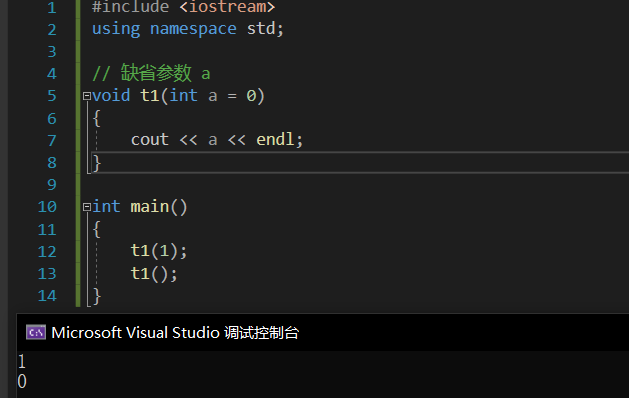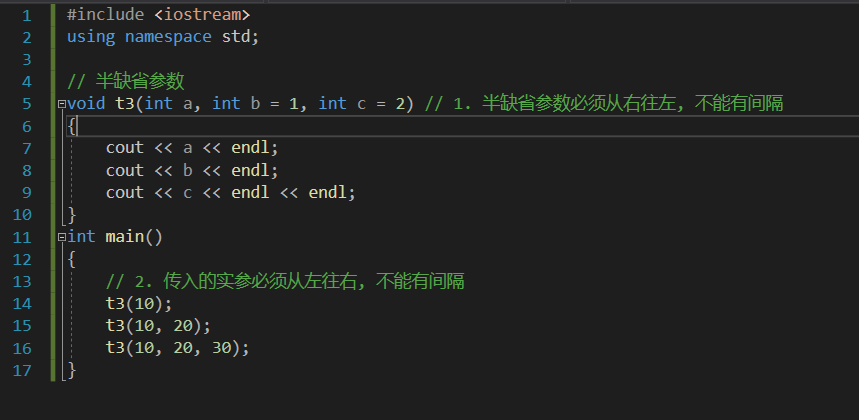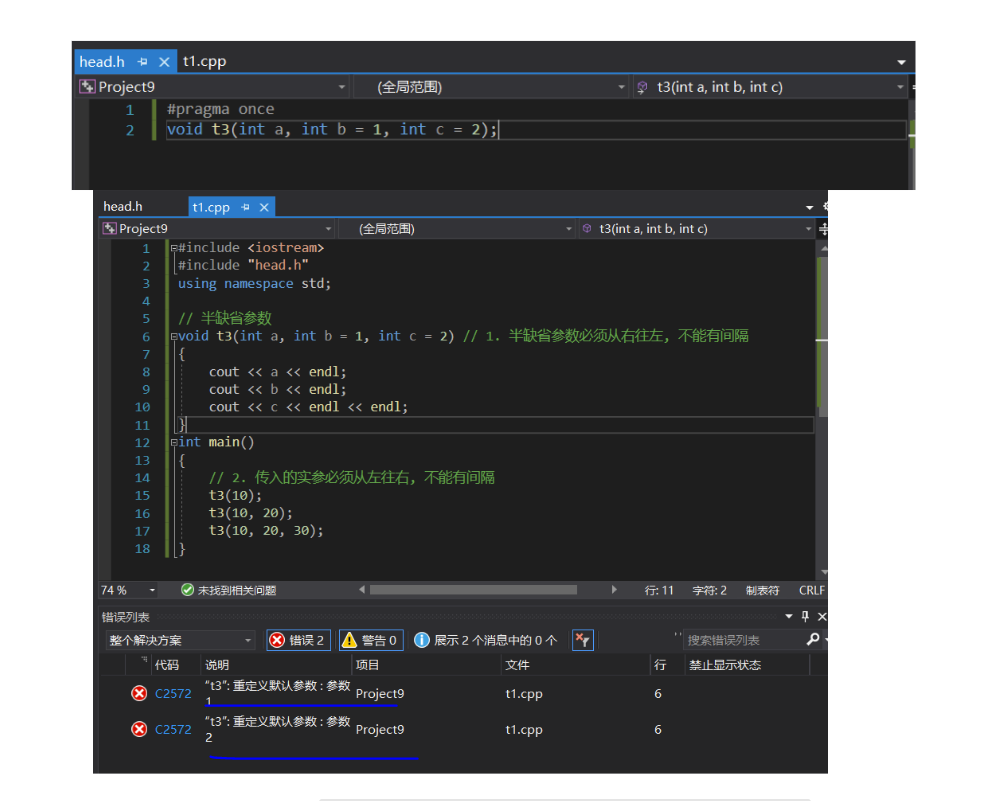C++基础2: 优化C函数
1. 缺省参数
什么是缺省参数
缺省参数是声明或者定义函数时为函数的参数指定一个默认值,如果函数调用时没有传入实参, 那么这个默认值会被当做实参,如下例子

函数调用时, 传入参数1, a = 1,不传入参数, 默认a = 0, 这里的a就是一个缺省参数
缺省参数的分类
缺省参数分全缺省和半缺省参数
全缺省参数: 每个参数都有默认值
#include <iostream>
using namespace std;
// 全缺省
void t2(int a = 1, int b = 2, int c = 3)
{
cout << a << endl;
cout << b << endl;
cout << c << endl << endl;
}
int main()
{
t2();
t2(10);
t2(10, 20);
t2(10, 20, 30);
}
半缺省参数: 部分参数带有默认值
#include <iostream>
using namespace std;
// 半缺省参数
void t3(int a, int b = 1, int c = 2)
{
cout << a << endl;
cout << b << endl;
cout << c << endl << endl;
}
int main()
{
t3(10);
t3(10, 20);
t3(10, 20, 30);
}
使用缺省参数的注意事项
1. 半缺省参数必须从右往左, 不能有间隔
2. 传入的实参必须从左往右, 不能有间隔

3. 缺省参数不能再函数声明和定义出重复出现

4. 如果函数声明与定义分离时, 在函数声明里定义缺省参数
缺省参数的应用
下面用一个实际的应用场景来说明为什么缺省参数会是C函数设计中的不足
C语言实现的栈初始化:
head.h
#pragma once
#include <stdio.h>
#include <stdlib.h>
#include <assert.h>
#include <stdbool.h>
#define INIT_SZ 4
typedef int STDataType;
typedef struct stack
{
STDataType* dys;
int capacity;
int top;
}stack;
// 初始化
void STInit(stack* ps);test.c
#include "head.h"
void STInit(stack* ps)
{
assert(ps);
STDataType* tmp = (STDataType*)malloc(sizeof(STDataType) * INIT_SZ);
if (NULL == tmp)
{
perror("STInit::malloc fail");
return;
}
ps->dys = tmp;
ps->capacity = INIT_SZ;
ps->top = 0;
}
int main()
{
stack st;
STInit(&st);
}C++用缺省参数实现的栈初始化:
head.h
#pragma once
#include <stdio.h>
#include <stdlib.h>
#include <assert.h>
#include <stdbool.h>
typedef int STDataType;
typedef struct stack
{
STDataType* dys;
int capacity;
int top;
}stack;
// 初始化
void STInit(stack* ps, int capacity = 4); // 缺省参数 capacitytest.cpp
#include "head.h"
void STInit(stack* ps, int def_capacity)
{
assert(ps);
STDataType* tmp = (STDataType*)malloc(sizeof(STDataType) * def_capacity);
if (NULL == tmp)
{
perror("STInit::malloc fail");
return;
}
ps->dys = tmp;
ps->capacity = def_capacity;
ps->top = 0;
}
int main()
{
stack st1;
stack st2;
// 处理未知数据个数的情况
STInit(&st1);
// 处理已知数据个数的情况
STInit(&st2, 100);
}假设已经知道要向栈内入100个数据, C语言实现的栈需要不断的扩容, 而C++ 可以用缺省参数直接初始化100个空间提高效率
即使数据个数未知, 也可以不传参用默认开辟的空间, 不够时扩容, 所以使用缺省参数会更灵活
2. 函数重载
什么是函数重载
函数重载是函数的一种特殊情况,其允许在同一域中出现同名的函数
但是这些同名函数必须满足(参数类型不同, 参数个数不同, 参数顺序不同)其中一个条件, 如下
// 1、参数类型不同
int Add(int left, int right)
{
return left + right;
}
double Add(double left, double right)
{
return left + right;
}// 2、参数个数不同
void f()
{
cout << "f()" << endl;
}
void f(int a)
{
cout << "f(int a)" << endl;
}// 3、参数类型顺序不同
void f(int a, char b)
{
cout << "f(int a,char b)" << endl;
}
void f(char b, int a)
{
cout << "f(char b, int a)" << endl;
}




 浙公网安备 33010602011771号
浙公网安备 33010602011771号